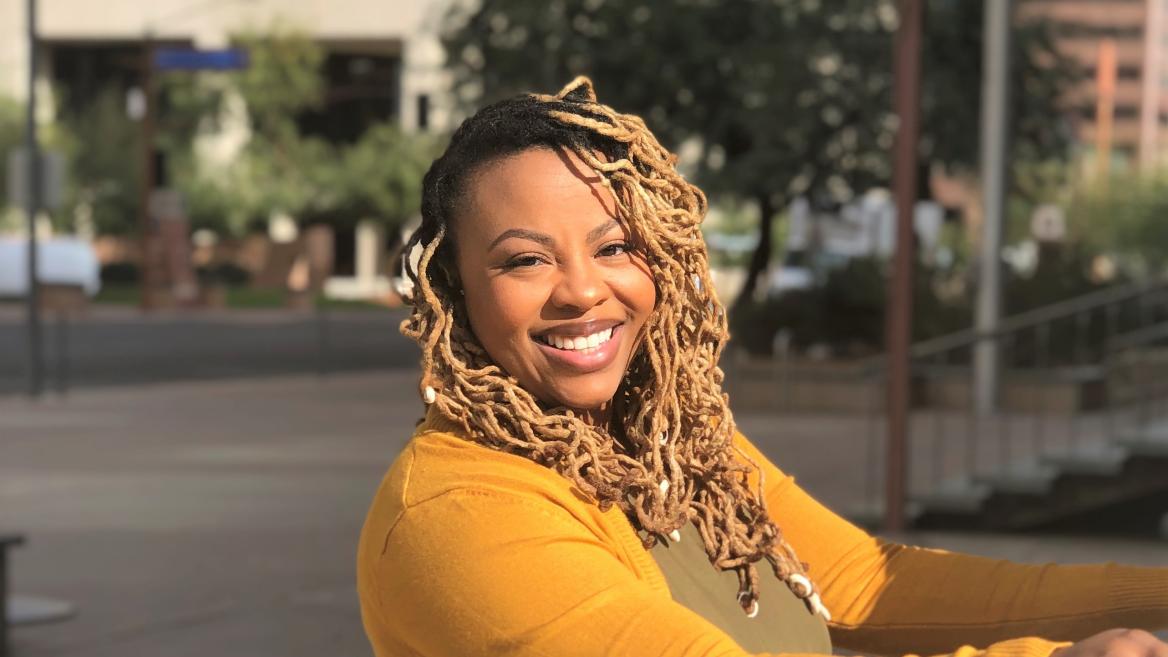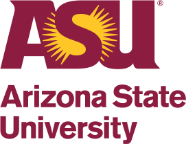
Persistence pays off for health entrepreneurship and innovation graduate
By
—
Editor’s note: This is part of a series of profiles for fall 2018 commencement. Read about more graduates.
When Danielle Martin decided she wanted to return to college to finish her degree, her first step was picking a program she liked, one that she could make her own. Her advisor from the College of Nursing and Health Innovation helped her identify the BS in health entrepreneurship and innovation as the right fit.
“It is all encompassing so you can do anything with it,” Martin said.
Having spent the last 11 years working in the health care industry in Arizona, Martin was familiar with the flaws in the system, but this degree program helped her identify ways to come up with fixes.
“The biggest thing that I learned is the lack of health literacy, people don’t have a full understanding of what it means when they’re diagnosed with something or when they’re given prescription medication,” Martin said.
Through her courses, she decided tackling this issue would be a primary focus for her going forward. Now, she’s hoping to create a program that will better help individuals understand their health with an emphasis on prevention.
She did all this while working and raising her daughter. Martin admits, there were times where she struggled and wasn’t giving school her all but she maintained, saying her daughter was her motivation.
“I want her to have better than what I had. Don’t get me wrong, I had a very good childhood with a lot of opportunities and incredible family support, but I want her to see that you can do whatever you want. Get the knowledge you need and you can make the impossible, possible.”
Now, not only is she graduating with her bachelor’s degree but Martin is applying to graduate school as well to continue her efforts to make an impact for the better on individuals' health.
Question: What’s something you learned while at ASU — in the classroom or otherwise — that surprised you or changed your perspective?
Answer: When I started here at ASU, I was coming back to school. I am now 32. I was very surprised to see that the school was very diverse, not one's first thought of racial or ethnic backgrounds, but diverse in age groups as well. I knew coming in that I was going to be the oldest in the classroom and that made me very anxious. I told myself, I am either going to embrace myself and this opportunity or not even try. So I went into my classes with my humor and talked to everyone I could. After my first set of classes, I just knew I fit right in. I enjoyed conversation with any and everyone I could talk to. You never know what you can learn from another individual and I embraced the knowledge from everyone.
Q: Which professor taught you the most important lesson while at ASU?
A: Janet O'Brien saw in me what I didn't see myself. I have always prided myself on my work, but when my family experienced a significant death in our lives, I was worried about my family. I was stressed about work, my family and for the first time, I put school on a shelf. This was the first semester that I found myself not caring and not trying, which truly isn't me. Halfway through the course I found myself and worked hard to get the best grades I could get. For the class I had with Professor O'Brien that was a B. I received an email from Professor O'Brien stating "I just wanted to drop you a line because I was surprised by something. When I post grades, I rarely feel that the grade I'm posting doesn't match a student's ability. Your grade is one exception. As I stated in my feedback for your final project, I was impressed by your ideas and work." This email reminded me of what I was doing and why I was doing it. It also showed me just how much some teachers care. Professor O'Brien has allowed my work to be an exemplar of ideas to come. It always means something when someone outside of your greatest fans recognizes your greatness and tell you it's there. While this semester was hard for me, I found a meaning for my work during this time.
Q: What was your favorite spot on campus, whether for studying, meeting friends or just thinking about life?
A: My favorite spot on campus has to be the patio tables outside of the Health South Building downtown. I love that building specifically for the FOOD! My first semester at ASU I took NTR142 Applied Nutrition. It's the class to cook, I was always excited to make something different every week. Whenever I have time between classes I would go see what the other classes were selling for lunch. They always had something new and fun to try. The patio provided shade and a chill place to enjoy the desert weather and do some homework while enjoying whatever playlist I had going on that day.
Q: What are your plans after graduation?
A: It's funny how plans change. I just finished all of my essays for my application to the Master in Health Innovation (program) when I realized I could apply to the Nursing and Health Innovation PhD program that I envisioned applying to after earning my master's degree. With that being said, I am currently mulling over my different writing samples to submit with my application. I look forward to continuing my education efforts and increasing my network to allow for time to volunteer at a nonprofit to gain more exposure to the communities I want to help. I also plan to continue work on my innovative project for health literacy that I started developing throughout my coursework these past two years.
Q: If someone gave you $40 million to solve one problem on our planet, what would you tackle?
A: With $40 million dollars I can think of three things I could make happen, or at least get the appropriate gears turning for. I would have the necessary funding to put my innovation ideas toward health literacy to work. I see my idea really helping a large population in our communities. Allowing individuals to better take control of their own health and well-being. I would also work to create a nonprofit health center in a low socioeconomic area. The health center would have doctors and nurses that volunteer their time to provide care. The last thing I would do is work on my own research to use toward policy changes in regards to health education across the life cycle. I believe in being able to educate people to understand the importance of living a healthy lifestyle. I would also provide health and nutrition education that would cater to all areas. I want to take people to the place of living a life where you only see the doctor for prevention versus having to take the time to try to treat an acute or chronic condition as they age.
